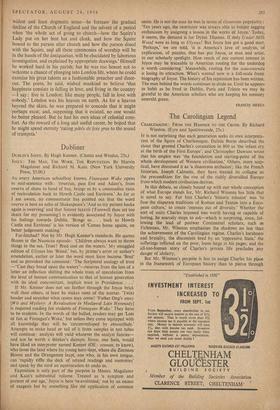Dubliner
DUBLIN'S JOYCE. By Hugh Kenner. (Chatto and Windus, 25s.) As every American schoolboy knows, Finnegans Wake opens in mid-sentence with : 'riverrun, past Eve and Adam's, from swerve of shore to bend of bay, brings us by a commodius virus of recirculation back to Howth Castle and Environs.' As far as I am aware, no commentator has pointed out that the word swerve is here an echo of Shakespeare's 'And so my pattent backe again is swerving' and that Sonnet lxxxvii ('Farewell thou art too deare for my possessing') is evidently associated by Joyce with his feelings towards Dublin. 'Brings us . . . back to Howth Castle and Environs' is his version of 'Comes home againe, on better judgement making.'
Far-fetched? Not by Mr. Hugh Kenner's standards. He quotes Bloom in the Nausicaa episode : 'Children always want to throw things in the sea. Trust? Bred cast on the waters.' My smuggled edition of Ulysses has 'Bread,' but, by printer's error or author's emendation, earlier or later the word must have become 'Bred' and so provoked the comment: 'The Scriptural analogy of trust —"Cast they breafrl upon the waters"—receives from the loss of a letter an inflection shifting the whole train of speculation from the level of human communication to that of human generation with its ideal concomitant, implicit trust in Providence. . . If Mr. Kenner does not see farther through the Joyce brick wall than others, at least he makes most of the mortar. 'Twixt header and stretcher what reams may come! 'Father Ong's essay [Wit and Mystery: A Revaluation in Mediaeval Lain Hymnody] is required reading for students of Finnegans Wake.' They have to be students. In the words of the ballad, readers may get 'Lots of fun at Finnegan's Wake,' but unless they come equipped with all knowledge they will be 'circumveiloped by obscurffads.' Attempts to make head or tail of it from samples in test tubes will continue: analysis will yield whatever the analyst fancies— and not be worth a thinker's daimon. Joyce, one feels, would have liked an interpreter named Kenner (OE: cennan, to know), who loves the land where his young hero slept, where die Zitronen' Bloom and the Orangemen leapt, one who, in his own tongue, can 'rapidly riffle the deck of related readings and memories' and speak by the card an equivocation to undo us.
Exposition is only part of the purpose in Messrs. Magalaner and Kain's substantial volume. Treated as 'a sympton and portent of our age,' Joyce is here 're-evaluated,' not by an excess of exegesis but by something like the application of common
sense. He is not the man he was in terms of classroom popularity : `Ten years ago, the instructor was always able to bolster sagging enthusiasm by assigning a lesson in the works of Joyce.' Today, it seems, the demand is for Dylan Thomas. if only Under Milk Wood were as long as Ulysses! But Joyce has got a good start. 'Perhaps,' we are told, 'it is America's love of analysis, of explication, of puzzles, that has put Joyce, as man and artist, in our scholarly spotlight. How much of our current interest in Joyce may be traceable to American rooting for the underdog is worth considering.' Meanwhile, rooting for the sous-entendu is losing its attraction. What's wanted now is a full-scale frank biography of Joyce. The history of his reputation has been written. The man behind the words continues to elude us. Until he appears in habit as he lived in Dublin, Paris and Trieste we may be grateful to the American scholars who are keeping his memory emerald green.
FRANCIS MERES


























 Previous page
Previous page